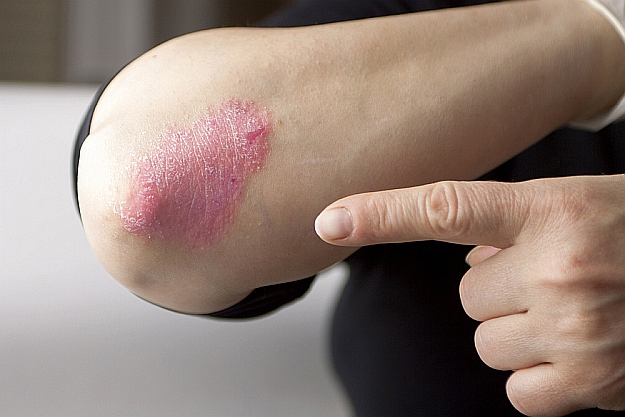

When it comes to eczema vs psoriasis, pinning down exactly what you have can be certainly confusing. There are different types of skin conditions that fall under the “dermatitis” umbrella. These include atopic eczema (atopic dermatitis) and seborrheic dermatitis. Then there’s psoriasis vulgaris or simply psoriasis. This can also have a few variations such as plaque psoriasis or erythrodermic psoriasis. Knowing the difference, though, is important. The underlying causes can vary, and so does the possible treatment. Learn the difference between them today.
Eczema vs Psoriasis | Learn to Spot the Difference
In This Article:
General Clues
With eczema vs psoriasis, it’s not always easy to tell the triggers of the skin condition. If you can determine the underlying factor, it will often solve the mystery.
Eczema or dermatitis typically breaks out after exposure to irritating environmental conditions including food allergies. This hypersensitivity reaction is more common among those with a family history of hay fever, asthma, and eczema. It can be a long-term chronic condition. In other words, you become prone to flare-ups.
Psoriasis is an autoimmune condition. The immune system reaction causes the skin cell production to go into overdrive. Factors such as stress, illness, and unhealthy habits like smoking can trigger this response. As with eczema, psoriasis can be chronic.
Age can play a part in the type of rash people develop. Babies and children are more likely to have eczema while psoriasis is more common in teens and adults. Exceptions exist, though. Younger children can continue to have eczema flare-ups during adolescence, for example.
The most common types of psoriasis appear as a scaly skin. White or silvery scales cover what looks like vivid red, somewhat solid rashes. The rash itself is usually irregularly shaped but with well-defined borders. The rough-looking, raised scales on top are extra accumulated skin cells.
Eczema is often a duller reddish brown and can include small pus-filled bumps. The rash usually has a “splotchy” look rather than a solid one.
Of the two conditions, eczema can lead to the most intense itchy skin, especially at night. On the other hand, the presence of joint aches indicates psoriasis. Some people with psoriasis may even develop psoriatic arthritis.
Body Placement

Sometimes where the rash appears can settle the eczema vs psoriasis confusion. Psoriasis is most likely to appear on the outside of the elbows and knees. Rashes on the underside of those joints are more likely to be eczema. Scalp scaling in adults is often psoriasis. In infants, it’s more likely to be seborrheic dermatitis or cradle cap eczema.
In general, body placement isn’t usually the best clue. Both skin conditions can appear on the face, body creases, hands, legs, feet, and elsewhere.
Patchiness and Peeling
Both eczema and psoriasis can involve reddish patchiness where the skin is driest. Often, psoriasis patches will have silvery scales on top of the red rashes. Sometimes, though, psoriasis patches are just expanses of cracked, reddish skin that are excessively dry and tend to flake.
Eczema dry skin tends to involve large spreads of reddish blotches that peel off the way a sunburn rash does. Occasionally, blisters can appear under the eczema rash once it peels away.
In either case, removing the patches should be done gently, if at all. Trying to scrub them off will do more harm than good. Instead, use a soothing cream that gently softens any scales or dried blisters.
Above-the-Neck Rashes
Facial rashes are more likely to be eczema than psoriasis. They are usually tiny pinkish bumps that have pus inside. If the rash is extremely dry, you may notice cracks.
If you have psoriasis above the neck, it will more likely appear on the scalp and on the periphery of your face like your forehead or ears. The abscesses are usually teardrop-shaped scales. Many people don’t realize they have scalp psoriasis. Rather, they mistake it for dandruff because of the flaking.
Although both types of rash can be tempting to scratch, resist it. Scratching can result in infection of the blisters and scales. It can also leave behind facial marks if you continually break the skin.
Hand Rashes
You can also compare eczema vs psoriasis on the hands. Many believe eczema is always on the palms of the hands and psoriasis on the back.
This can be a good place to start when it comes to diagnosis. After all, eczema flare-ups often occur when a body part comes into contact with an irritant. Your palms are more likely to grasp, carry, or touch those sensitizing substances than the backs of your hands are.
Psoriasis often causes rough-looking backs of hands. In addition, it can affect the nails. They tend to darken and get scaly around the edges. Psoriasis isn’t known for itchiness the way eczema is, but if it does appear on the palms, the itching can be intense.
Again, both types of rashes can be unpredictable. The location of the rash isn’t as telling as what it looks like or what triggered it.
Rashes on the “Hidden” Body Parts
Both eczema and psoriasis tend to occur in skin creases. These include the groin, armpits, buttocks, under the breasts, and soles of the feet. In these cases, comparing eczema vs psoriasis can be challenging. Not only are these rashes harder to see, but they can look alike. Psoriasis rashes in the folds of the skin get more moisture, which makes it less scaly in texture than other forms of psoriasis.
Many of these rash areas can be embarrassing. If you do develop redness and itching in these places, asking your doctor to examine them is still your best bet for diagnosis and treatment.
Eczema vs Psoriasis: Treatment

As with the symptoms of eczema vs psoriasis, some treatments can work with both conditions. It’s still important, though, to determine the exact condition. Severe cases of either eczema or psoriasis can require different prescription medications. In addition, preventative measures may differ.
For mild to moderate eczema or psoriasis, a cream or lotion with moisturizing properties can soothe symptoms. Moisturizing creams also provide a protective barrier to prevent further drying.
Medications for severe eczema outbreaks are likely to contain ingredients with calcineurin inhibitor action. They can interact with the immune system to ease inflammation. For itching, an antihistamine may help, whether in topical or oral form. Cool compresses can also be soothing.
Sometimes severe itching becomes such a problem with eczema an infection occurs. If your doctor suspects bacteria have entered through open wounds from scratching, they may prescribe a prescription antibacterial cream.
How to Treat Psoriasis
For psoriasis, corticosteroid creams are available over the counter. They may soothe the swelling and itching of moderate psoriasis. These topical treatments also help slow the rate of skin cell growth that’s responsible for the raised scales of psoriasis. Other lotions and ointments can contain have coal tar or salicylic acid.
More severe cases of psoriasis may require a prescription of vitamin D creams or ointments containing retinoids. These topical treatments promote the production of healthier skin cells to replace older ones. You may also receive an injection of retinoids and other medications when a psoriasis outbreak is particularly bad.
Both psoriasis and eczema may respond well to ultraviolet light therapy. This treatment tends to reduce inflammation and prevent out-of-control skin cell generation. Note, though, too much UV exposure can put you at risk for skin cancer. Always work with a doctor for this one.
Still confused between eczema and psoriasis? Watch this video from Question Everything:
Ultimately, to settle the score of eczema vs psoriasis, you may need to go to a board-certified dermatologist. This is necessary if your rash isn’t reacting well to basic home treatments and over-the-counter skin creams, lotions, or ointments. Outright cures can be difficult, but soothing the rash so it becomes less unsightly and uncomfortable is a realistic goal.
Do you have either eczema or psoriasis? What kinds of treatments do you do? Share your comments below!
Up Next: Essential Oil For Psoriasis: Try These 7 Scents
